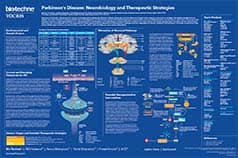Catechol O-Methyltransferase
Catechol O-Methyltransferase (COMT) (EC 2.1.1.6) catalyzes the transfer of a methyl group from S-adenosyl-L-methionine (AdoMet) to a catechol substrate, such as dopamine or levodopa, in the presence of magnesium (Mg2+) ions.
Catechol O-Methyltransferase Inhibitors |
|
|---|---|
| Cat. No. | 产品名称/活性 |
| 4720 | Entacapone |
| Potent COMT inhibitor; blocks α-synuclein aggregation | |
| 7668 | Opicapone |
| COMT inhibitor | |
| 0483 | OR-486 |
| COMT inhibitor | |
| 5864 | Tolcapone |
| COMT inhibitor; also inhibits transthyretin aggregation | |
Catechol O-Methyltransferase (COMT) (EC 2.1.1.6) catalyzes the transfer of a methyl group from S-adenosyl-L-methionine (AdoMet) to a catechol substrate in the presence of magnesium (Mg2+) ions. COMT substrates include dopamine, norepinephrine, epinephrine and levodopa. There are two isoforms of COMT: soluble (S-) COMT and membrane-bound (MB-) COMT.
COMT is ubiquitously expressed, with the highest COMT activity occurring in the liver and kidneys. Notable expression of COMT occurs in kidney proximal tubular epithelial cells, where the enzyme is thought to indirectly regulate the metabolism of dopamine and other catecholamines. However, a significant focus of research has been the involvement of COMT in the adverse effects associated with the use of levodopa for Parkinson's disease (PD) therapy.
Prior to reaching the brain, orally administered levodopa can be metabolized in peripheral tissues by either COMT or L-amino acid decarboxylase (AADC). Metabolism of levodopa by COMT produces 3-O-methyldopa, a metabolite with no therapeutic effect in PD and that competes with levodopa for transport into the brain, thereby attenuating the therapeutic benefit of levodopa. This effect is thought to underlie the "wearing off" phenomenon associated with levodopa treatment; a phenomenon that is characterized by motor fluctuations or dyskinesias in PD patients following long-term levodopa treatment. Thus, inhibiting peripheral COMT improves the bioavailability of levodopa in the brain and decreases the "wearing off" phenomenon.
External sources of pharmacological information for Catechol O-Methyltransferase :
Literature for Catechol O-Methyltransferase
Tocris offers the following scientific literature for Catechol O-Methyltransferase to showcase our products. We invite you to request* your copy today!
*Please note that Tocris will only send literature to established scientific business / institute addresses.
Parkinson's Disease Poster
Parkinson's disease (PD) causes chronic disability and is the second most common neurodegenerative condition. This poster outlines the neurobiology of the disease, as well as highlighting current therapeutic treatments for symptomatic PD, and emerging therapeutic strategies to delay PD onset and progression.
